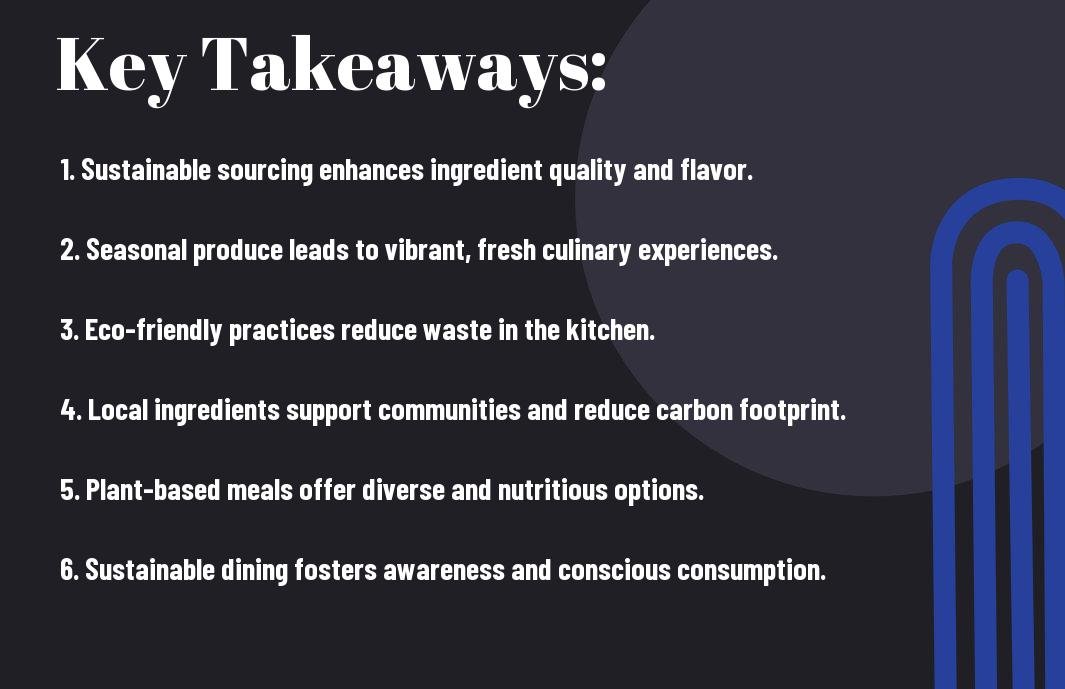It’s time for you to explore the intersection of sustainability and fine dining, where conscious choices not only benefit the planet but also enhance your culinary experiences. By embracing locally sourced ingredients and minimizing food waste, you can enjoy meals that are both delectable and environmentally friendly. Adopting sustainable practices allows you to discover unique flavors and support local economies, enriching your gastronomic adventures. So, let’s probe into how these changes can transform your dining experiences and the food landscape around you.


Understanding Sustainable Practices
While exploring the culinary landscape, you may come across various sustainable practices that enhance not only the quality of your food but also the wellbeing of our planet. Embracing these practices means recognizing their significance in your gastronomic adventures, as they allow you to make informed decisions that positively impact both your palate and the environment.
Defining Sustainability in Gastronomy
On your journey through the world of food, sustainability in gastronomy means creating meals that align with environmental health, social equity, and economic viability. It encompasses the use of renewable resources, responsible production methods, and minimizing waste, ensuring your dining experience contributes to a balanced ecosystem.
The Importance of Local Sourcing
To truly appreciate the flavors of your region, local sourcing plays a vital role in sustainable gastronomy. By obtaining ingredients from nearby producers, you not only support the community but also reduce the carbon footprint associated with transportation. It empowers you to enjoy fresher and more flavorful dishes while fostering a healthier relationship with your environment.
Sourcing ingredients locally is more than just a trend; it’s a commitment to sustainability that connects you with your community. By purchasing from local farmers and artisans, you’re actively reducing the environmental impact related to long-distance transportation, which often involves high energy consumption and greenhouse gas emissions. Furthermore, local foods tend to be fresher and more nutritious, providing you with superior flavors that enhance your culinary experiences. Supporting local economy means investing in responsible practices that prioritize ethical treatment of both workers and the land, ensuring a sustainable future for all those involved in the food chain.
Enhancing Flavor through Sustainable Ingredients
Assuming you have a passion for food, incorporating sustainable ingredients can significantly elevate your culinary experience. Not only do these ingredients often boast better flavor profiles, but they also tend to be fresher and more nutrient-dense. By choosing local and organic options, you enhance your dishes while supporting eco-friendly practices and your local economy, allowing your gastronomic adventures to reflect a commitment to sustainability.
The Impact of Fresh Produce on Taste
Produce sourced directly from local farms often exhibits a taste that is superior to commercially farmed options. Careful cultivation methods, regional soil conditions, and the time between harvest and consumption all contribute to an explosion of flavor that can transform your meals. You’ll find that tomatoes bursting with flavor, herbs with aromatic intensity, and greens that crunch with freshness create a delightful vibrancy in every bite.
Connecting with Seasonal Eating
After embracing sustainable practices, you may find that connecting with seasonal eating can deepen your appreciation for food. This approach allows you to enjoy ingredients at their peak freshness, which translates to enhanced taste and nutrition. By aligning your meals with the seasons, you’ll not only experience a wider variety of flavors but also support local farming practices.
For instance, indulging in *summer’s ripe berries* or *fall’s hearty squash* allows you to fully savor what nature offers in each season. Eating *seasonally* means your ingredients are at their peak, maximizing their *nutritional benefits* and *flavor intensity*. Additionally, you’ll reduce *carbon footprints* by minimizing the transportation of goods. As you explore the vibrant offerings of each season, you may find that your palate expands, and your creativity in the kitchen flourishes, making every meal a joyful and sustainable experience.

Techniques for Sustainable Cooking
To elevate your gastronomic adventures sustainably, adopting eco-friendly cooking techniques is necessary. By integrating methods such as meal prepping, plant-based cooking, and using seasonal ingredients, you not only enhance the flavors of your dishes but also minimize your ecological footprint. These practices allow you to enjoy culinary delights while being mindful of the environmental impacts of your choices.
Waste Minimization in the Kitchen
One of the simplest yet effective ways to practice sustainability in your kitchen is through waste minimization. This encompasses techniques like composting food scraps, reusing leftovers creatively, and reducing packaging waste. By being intentional about what you consume and how you dispose of it, you contribute positively to the environment while enjoying a more resourceful cooking experience.
Energy-Efficient Cooking Methods
Beside managing waste, utilizing energy-efficient cooking methods can significantly reduce your environmental impact. Strategies such as using pressure cookers, slow cookers, and cast-iron cookware not only save you energy but also enhance the flavors of your food.
This shift towards energy-efficient cooking is not just beneficial for the planet; it can also improve your culinary outcomes. Using pressure cookers can cut cooking times drastically, saving you both electricity and your valuable time. Similarly, slow cookers allow for deeper flavors while utilizing lower heat, minimizing energy usage. You might also consider turning off your oven early and letting residual heat complete the cooking process, a method that not only saves energy but adds a touch of creativity to your cooking. Adopting these techniques ensures that your gastronomic adventures resonate with sustainability and taste.
The Role of Education in Sustainable Gastronomy
Not only does education empower you with knowledge about sustainable practices, but it also inspires you to make environmentally-conscious choices. Understanding the impact of your food choices elevates your culinary experiences and fosters a deeper appreciation for local ingredients and traditional cooking methods. By learning about sustainability, you become an informed consumer, better equipped to support ethical and responsible gastronomy.
Learning from Chefs and Culinary Experts
At the forefront of sustainable gastronomy are chefs and culinary experts who advocate for and practice sustainable methods. By sharing their insights and experiences, they provide you with valuable lessons on sourcing local ingredients, minimizing waste, and embracing seasonal cooking. Their expertise can enhance your culinary skills and broaden your understanding of how food systems work.
Engaging with Community Initiatives
Along your journey towards sustainable gastronomy, engaging with community initiatives can significantly enrich your experience.
The power of community initiatives lies in their ability to connect you with local food producers, environmental organizations, and fellow enthusiasts who share your passion for sustainability. By participating in programs such as farmers’ markets, community-supported agriculture (CSA), and food co-ops, you contribute to a more sustainable local food system. These initiatives often emphasize seasonality and biodiversity, leading to a greater appreciation for the environmental impact of your dining choices. Additionally, being involved fosters a sense of community and belonging, reminding you that your efforts towards sustainability can have a collective impact.
Benefits of Sustainable Practices for Diners
After embracing sustainable practices, you will find your dining experiences enriched in various ways. These practices not only reduce environmental impact but also foster a deeper connection to the food you consume. By opting for sustainable dining, you support local communities, enhance flavor profiles, and discover innovative recipes that reflect seasonal ingredients. This not only amplifies your pleasure but also plays a part in promoting a healthier planet.
Healthier Choices and Nutritional Value
About engaging with sustainable food sources means you are more likely to enjoy meals packed with nutrients and free from harmful additives. Foods grown using sustainable practices typically prioritize organic methods, ensuring that your meals are rich in flavor and important vitamins and minerals. When you choose to dine sustainably, you are making a conscious decision to nurture your body while supporting agricultural practices that are beneficial for the environment.
The Experience of Mindful Eating
Nutritional benefits extend beyond ingredients when you practice mindful eating. By focusing on your meal and its origins, you cultivate a deeper appreciation for each bite, allowing you to indulge your senses fully. This can transform the act of eating into a thoughtful experience, where you savor flavors and textures, elevating your overall enjoyment of food.
Understanding the concept of mindful eating allows you to slow down and fully engage with what you consume. This heightened awareness fosters a better relationship with food and can lead to improved digestion and satisfaction during meals. As you take the time to consider sourcing, preparation, and flavors, you can cultivate a sense of gratitude for the sustenance provided, which in turn enhances the joy and experience of dining. By recognizing the stories behind your meals, you open yourself to a more enriching and rewarding eating ritual.
Case Studies in Sustainable Culinary Innovations
Many innovative chefs and establishments are revolutionizing the food industry through sustainable practices, showcasing the endless possibilities of responsible gastronomy. Here are notable case studies:
- Blue Hill at Stone Barns: Uses a farm-to-table model, sourcing 80% of its ingredients from local farms.
- Noma: Pioneers in foraging and permaculture techniques, reducing waste by 70%.
- The Stone Kitchen: Zero-waste restaurant achieving 100% composting of food scraps.
- Alinea: Implements regenerative agriculture, with partnerships that elevated local farmers’ incomes by 50%.
Explore more about this approach in 1/5 Embracing Sustainability in Gastronomy.
Restaurants Leading the Way
At the forefront of sustainable culinary innovation, many restaurants are implementing practices that reduce environmental impact while elevating taste. Establishments like Eleven Madison Park have transitioned to a plant-based menu, significantly lowering their carbon footprint, while also inspiring others in the industry.
Successful Farms and Collaborations
Any pursuit of sustainability in gastronomy relies on partnerships with dedicated farms committed to ethical practices.
Farms across the globe are forgoing harmful chemicals and adopting regenerative agriculture for soil health and biodiversity. Collaborations between restaurants and these farms, like Stone Barns Center for Food & Agriculture and community-supported agriculture programs, ensure that you receive fresh, organic produce while supporting local economies. These synergies promote transparency and create a robust supply chain, further enhancing the culinary landscape.
Summing up
Considering all points, incorporating sustainable practices into your culinary experiences can significantly enhance your gastronomic adventures. By prioritizing local ingredients, reducing waste, and supporting ethical farming, you not only improve the quality and taste of your meals but also contribute to environmental conservation. This mindful approach to dining allows you to connect deeply with the food you consume, creating a more enjoyable and meaningful experience. Ultimately, embracing sustainability in your culinary choices empowers you to make a positive impact while savoring every bite of your dining journey.









